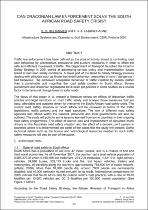JavaScript is disabled for your browser. Some features of this site may not work without it.
- ResearchSpace
- →
- Research Publications/Outputs
- →
- Conference Publications
- →
- View Item
| dc.contributor.author |
Mohammed, SO

|
|
| dc.contributor.author |
Labuschagne, FJJ

|
|
| dc.date.accessioned | 2008-09-03T09:59:20Z | |
| dc.date.available | 2008-09-03T09:59:20Z | |
| dc.date.issued | 2008-07 | |
| dc.identifier.citation | Mohammed, SO and Labuschagne, FJJ. 2008. Can draconian law enforcement solve the South African Road Safety crisis?. Partnership for research and progress in Transportation. 27th Southern African Transport Conference (SATC), Pretoria, South Africa, July 7-11, 2008, pp 456-468 | en |
| dc.identifier.isbn | 978-1-920017-34-7 | |
| dc.identifier.uri | http://hdl.handle.net/10204/2452 | |
| dc.description | Paper presented at the 27th Annual Southern African Transport Conference 7 - 11 July 2008 "Partnership for research and progress in transportation", CSIR International Convention Centre, Pretoria, South Africa | en |
| dc.description.abstract | Traffic law enforcement has been defined as the area of activity aimed at controlling road user behaviour by preventive, persuasive and punitive measures in order to effect the safe and efficient movement of traffic. The Department of Transport launched the Road to Safety Strategy in 2001 aimed at addressing serious policy and implementation issues dealing with attitudes such as those that entail behaviour personified in risky / dangerous / bad behaviour. The perceived acceptable behaviour of traffic violation by society (rather than a punishment and draconian legislations have been pin-pointed in some studies as a crucial factor in behavioural change towards safer roads. The focus of this paper is to present a literature review on effects of draconian traffic policies and legal sanctions on road traffic safety and analyse those measures that are easy, affordable and outcome driven to overcome the South African road safety crisis. The current road safety situation in South Africa will be reviewed in terms of the legislations, traffic policing and the legal sanctions. The role of different road safety agencies and offices within the national, provincial and local governments will also be outlined. The study will point to some lessons learned from some countries in their ongoing road safety programmes. The effect of licence loss and imprisonment of convicted drunk drivers on the Australian road safety situation and the effect of a demerit point system in countries where it is implemented are some of the cases that the study will present. Some technical details such as the human and technological resources needed for such traffic safety will also be part of the paper | en |
| dc.language.iso | en | en |
| dc.publisher | Southern African Transport Conference (SATC) | en |
| dc.subject | Traffic law enforcement | en |
| dc.subject | Road traffic safety | en |
| dc.subject | Traffic policies | en |
| dc.subject | SATC | en |
| dc.title | Can draconian law enforcement solve the South African Road Safety crisis? | en |
| dc.type | Conference Presentation | en |
| dc.identifier.apacitation | Mohammed, S., & Labuschagne, F. (2008). Can draconian law enforcement solve the South African Road Safety crisis?. Southern African Transport Conference (SATC). http://hdl.handle.net/10204/2452 | en_ZA |
| dc.identifier.chicagocitation | Mohammed, SO, and FJJ Labuschagne. "Can draconian law enforcement solve the South African Road Safety crisis?." (2008): http://hdl.handle.net/10204/2452 | en_ZA |
| dc.identifier.vancouvercitation | Mohammed S, Labuschagne F, Can draconian law enforcement solve the South African Road Safety crisis?; Southern African Transport Conference (SATC); 2008. http://hdl.handle.net/10204/2452 . | en_ZA |
| dc.identifier.ris | TY - Conference Presentation AU - Mohammed, SO AU - Labuschagne, FJJ AB - Traffic law enforcement has been defined as the area of activity aimed at controlling road user behaviour by preventive, persuasive and punitive measures in order to effect the safe and efficient movement of traffic. The Department of Transport launched the Road to Safety Strategy in 2001 aimed at addressing serious policy and implementation issues dealing with attitudes such as those that entail behaviour personified in risky / dangerous / bad behaviour. The perceived acceptable behaviour of traffic violation by society (rather than a punishment and draconian legislations have been pin-pointed in some studies as a crucial factor in behavioural change towards safer roads. The focus of this paper is to present a literature review on effects of draconian traffic policies and legal sanctions on road traffic safety and analyse those measures that are easy, affordable and outcome driven to overcome the South African road safety crisis. The current road safety situation in South Africa will be reviewed in terms of the legislations, traffic policing and the legal sanctions. The role of different road safety agencies and offices within the national, provincial and local governments will also be outlined. The study will point to some lessons learned from some countries in their ongoing road safety programmes. The effect of licence loss and imprisonment of convicted drunk drivers on the Australian road safety situation and the effect of a demerit point system in countries where it is implemented are some of the cases that the study will present. Some technical details such as the human and technological resources needed for such traffic safety will also be part of the paper DA - 2008-07 DB - ResearchSpace DP - CSIR KW - Traffic law enforcement KW - Road traffic safety KW - Traffic policies KW - SATC LK - https://researchspace.csir.co.za PY - 2008 SM - 978-1-920017-34-7 T1 - Can draconian law enforcement solve the South African Road Safety crisis? TI - Can draconian law enforcement solve the South African Road Safety crisis? UR - http://hdl.handle.net/10204/2452 ER - | en_ZA |






